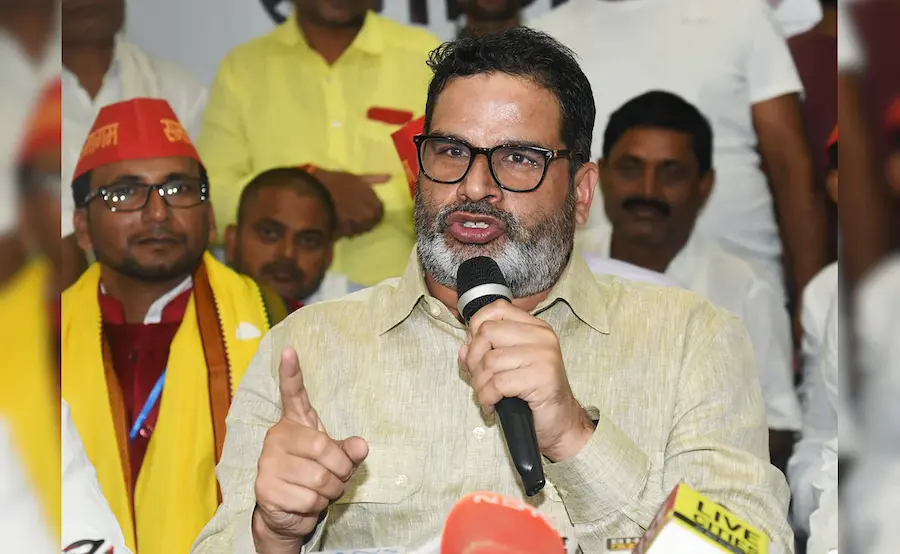
Prashant Kishor's statement, “No doubt the Election Commission is removing people’s names”, has stirred public concern
In a politically charged atmosphere ahead of the 2025 Bihar Assembly elections, Prashant Kishor, founder of the Jan Suraaj movement, has ignited a fierce debate by alleging that the Election Commission of India (ECI) is systematically removing names from the state’s voter rolls. His statement, “No doubt the Election Commission is removing people’s names”, has stirred public concern and drawn attention to the Special Intensive Revision (SIR) process currently underway in Bihar.
Kishor’s remarks came in response to claims by RJD leader Tejashwi Yadav, who alleged that his own name had been deleted from the draft electoral rolls and that his Elector’s Photo Identity Card (EPIC) number had been altered. While the ECI has denied these allegations and requested Yadav to submit the disputed EPIC card for investigation, Kishor insists that the revision process lacks transparency and disproportionately affects poor and marginalized communities.
According to data released during the SIR, approximately 35 lakh electors were found to have either migrated permanently or were untraceable at their registered addresses. Kishor argues that this figure is not just a statistical anomaly but a deliberate disenfranchisement, especially in districts with high concentrations of Muslim and tribal populations. He warns that the process is being conducted without clear communication, leaving many voters unaware that their names have been removed.
The ECI, for its part, maintains that the revision is essential to ensure clean and accurate electoral rolls, citing the need to eliminate duplicate and ineligible entries. However, critics like Kishor question the timing and intent of the exercise, especially when the 2024 Lok Sabha elections were conducted using the same voter list just a year ago. Kishor has demanded that the 2024 list be retained for the upcoming state elections, arguing that the current revision undermines the fundamental right to vote guaranteed under Article 326 of the Constitution.
Political Fallout: Allegations, Counterclaims, and the Battle for Bihar
The controversy has quickly escalated into a political flashpoint, with parties across the spectrum weighing in. Kishor’s assertion that “the Election Commission is not the master, the people are the masters” has resonated with many voters who feel alienated by bureaucratic processes. He insists that even if names are removed, those who remain on the rolls are “enough to remove BJP and Nitish Kumar” from power.
Meanwhile, the ECI has pushed back, stating that no formal objections have been filed by any political party since the publication of the draft rolls on August 1. This has led to further questions about the responsiveness of opposition parties, and whether they are adequately defending voter rights.
Kishor has also taken aim at Congress MP Rahul Gandhi, accusing him of mocking Biharis and showing indifference when they are attacked in other states. He claims that Gandhi’s recent visits to Bihar are politically opportunistic and disconnected from the ground realities. This rhetoric reflects Kishor’s broader strategy of positioning Jan Suraaj as a grassroots alternative to both the NDA and the INDIA bloc, emphasizing employment, governance, and transparency over traditional vote-bank politics.
The Samajwadi Party, too, has joined the chorus of criticism, demanding an immediate halt to the SIR process and questioning the government’s silence on related issues like Operation Sindoor, which allegedly involves national security concerns. These overlapping controversies have created a volatile political landscape, where electoral integrity, citizenship, and representation are all under the microscope.
Adding another layer of complexity is the issue of illegal migration. Government data from 2017 estimated that over 2 crore Bangladeshi nationals and Rohingyas were living illegally in India. While the ECI has not explicitly linked the voter list revision to this demographic, critics argue that the Aadhaar-driven verification process disproportionately targets minority communities, especially in districts like Purnia, Katihar, and Seemanchal, where Aadhaar registrations reportedly exceed population estimates.
The Road Ahead: Transparency, Trust, and the Future of Electoral Reform
At the heart of this controversy lies a fundamental question: Can India’s electoral system balance accuracy with inclusivity? Prashant Kishor’s challenge to the ECI is not just about numbers, it’s about trust. In a democracy as vast and diverse as India, the right to vote is sacred, and any perception of manipulation can erode public confidence.
Kishor’s call for greater transparency in the voter revision process has sparked a broader conversation about electoral reform. He argues that the ECI must clearly inform citizens whose names are being deleted and provide accessible mechanisms for appeal and correction. Without such safeguards, the revision risks becoming a tool of exclusion, rather than empowerment.
The ECI, on its part, has reiterated its commitment to “pure electoral rolls” and emphasized that the SIR is part of a nationwide effort to strengthen democracy. However, the lack of real-time communication, public hearings, and independent oversight has left many skeptical.
As Bihar prepares for its 2025 Assembly elections, the stakes are high. The state’s caste dynamics, economic challenges, and political fragmentation make it a bellwether for national trends. Kishor’s Jan Suraaj movement, though still nascent, could play a pivotal role in shaping the discourse especially if it continues to champion voter rights, transparency, and grassroots engagement.
Ultimately, the controversy over voter list revisions is a test of India’s democratic resilience. It challenges institutions to be more accountable, leaders to be more responsive, and citizens to be more vigilant. Whether the system rises to meet this challenge will determine not just the outcome of an election but the health of the republic itself.
Also read – Prashant Kishor Bribery Allegation Sparks Legal Battle: Bihar Minister Ashok Choudhary Files Defamation Suit
1 thought on “Democracy at Risk: Jan Suraaj Prashant Kishor Exposes Alarming Voter Purge in Bihar”
Comments are closed.